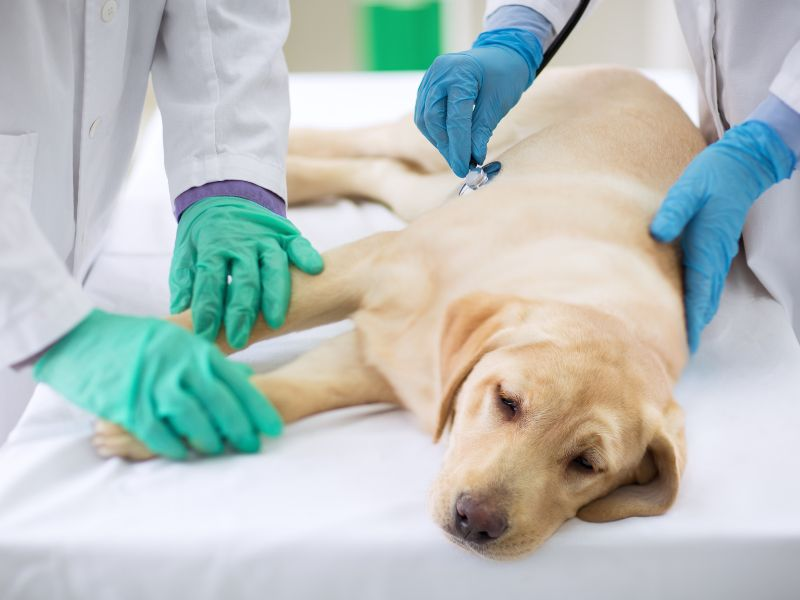If your dog has black dog poop, you might wonder what’s making it that way. Black poop in dogs may be a sign there’s a bigger issue, so making sure your dog’s poop is normal is the first step to their overall health.
Black Dog Poop: What To Look Out For?
Dog poop color definitely varies in dogs, and a lot of that depends on many things. The most important factor in dog poop color is what the dog’s digestive system is like. If they have variations in diet, hydration or health issues, that can affect the color of their poop. Generally speaking, a dog’s stool color should be brown, as this is a sign that their food has gone through the digestive system appropriately and efficiently. If you see black poop when your dog does their business, this could be a sign of many things. Healthy dog poop is not black, and black poop should be investigated.
If your dog’s poop is black, it could be a sign of stomach ulcers or bleeding in its upper digestive tract or their small intestine. Black poop, or even very dark brown poop is commonly that color because there may be blood in the stool, and it isn’t fresh or has had time to darken in color.
Sometimes this can be a one-and-done type of bowel movement and isn’t indicative of your dog’s health overall. Especially if they don’t have any more concerning stools and they’re acting normal.
But if your dog’s poop is consistently black, you should consult with your vet immediately because there may need to be immediate treatment.

If your dog’s poop is black, there may be internal bleeding
Internal bleeding in dogs may be a reason your dog has black poop. This can be due to anything from disease to medication side effects to viral or bacterial pathogens to an injury. If your dog has black tarry stools, internal bleeding may be happening. Look for the following additional symptoms if you see black dog poop.
- Weakness and/or lethargy
- Pale gums
- Rapid breathing or difficulty breathing
- Abdominal pain or bloated appearance
- Loss of consciousness/collapse
Any of those symptoms combined with black tarry stool should prompt you to take to your vet immediately. The proper treatment for black dog poop will depend a lot on your dog’s diet, as well as the shape of your dog’s gastrointestinal tract.
What are the most common causes of black dog poop?
Aside from internal bleeding or ulcers in your dog’s Gi Tract, there are other common causes of black dog poop. They include:
- Side effects from supplements or medication: Believe it or not, some pet owners will create black dog poop with the medicine they give. Things like human stomach settlers or even activated charcoal can be the cause of a dog’s black poop.
- Diet: What a dog eats definitely can turn a dog’s poop black. Dog food that is high in bone meal, charcoal or iron can be the reason a dog’s poop is dark brown or black. Many pet parents offer iron supplements to their dogs, and this can cause black dog poop.
- Intestinal Parasites: Parasites like whipworms or hookworms can make dog poop black, and you can often see these parasites in your dog’s poop regardless of color. These parasites can cause bleeding in their digestive tract, which leads to the black stools dog owners sometimes see.
- Ingesting foreign bodies: When dogs swallow things they shouldn’t, sometimes that causes blockages or bleeding. Dog poop may be black, and until the blockage is gone or the bleeding stops, you’ll likely see black dog poop.
- Diseases or health conditions: If your dog’s poop is black, this could be because certain diseases or health conditions like liver or kidney disease or cancer are at play. When a dog suffers from kidney failure or liver disease, you may see black dog poop as the first indicator.
Black dog poop treatment
If your dog’s poop is consistently black, you need to talk to your vet and be sure your dog is getting the proper treatment. Your vet will want a sample of blood tests your dog’s stool, and will conduct diagnostic tests to look for the causes of black dog stool. Imaging may be needed to determine if there is bleeding, and what the cause is, and treatment may include
- Blood transfusion to replace lost blood
- Medication to promote clotting and prevent more blood loss
- Surgery to repair the source of the bleeding.
Dog’s poop tells a lot about gut health
Just because your dog doesn’t have black stool, they could still have unhealthy guts and weakened immunity. While black dog poop is something that should be taken seriously because black stool often signifies a greater underlying issue, normal stool is a sign of good dog health and should always be the goal. Dark stools often trigger a pet parent to look more closely at other signs of their dog’s poop and health, but black dog poop is just one sign that a dog needs more focus on their gut health. That’s where Bernie’s Perfect Poop can make a big difference.
Bernie’s Perfect Poop is the supplement for your dog’s optimal gut health
Perfect Poop combines the best fiber, pre- and probiotics and digestive enzymes to make sure your dog’s gut is as strong and healthy as it can be. When your dog’s poop isn’t a nice, firm, chocolate brown, it’s usually a sign that their microbiome is not balanced and that can mean trouble for their overall health and immunity. Giving Perfect Poop with each meal will ensure maximum nutrient absorption while also keeping their ability to fight off things that may attack their gut it’s strongest.
Dogs love the delicious taste, and pet parents love how easy it is to give them the best.


